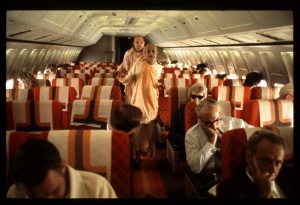CC Antya 4.191 (1975): Difference between revisions
(Vanibot #0027: CCMirror - Mirror CC's 1996 edition to form a basis for 1975) |
(Vanibot #0020: VersionCompareLinker - added a link to the Version Compare feature) |
||
| Line 2: | Line 2: | ||
<div style="float:left">'''[[Sri Caitanya-caritamrta (1975)|Śrī Caitanya-caritāmṛta (1975)]] - [[CC Antya (1975)|Antya-līlā]] - [[CC Antya 4 (1975)|Chapter 4: Sanātana Gosvāmī Visits the Lord at Jagannātha Purī]]'''</div> | <div style="float:left">'''[[Sri Caitanya-caritamrta (1975)|Śrī Caitanya-caritāmṛta (1975)]] - [[CC Antya (1975)|Antya-līlā]] - [[CC Antya 4 (1975)|Chapter 4: Sanātana Gosvāmī Visits the Lord at Jagannātha Purī]]'''</div> | ||
<div style="float:right">[[File:Go-previous.png|link=CC Antya 4.190 (1975)|Antya-līlā 4.190]] '''[[CC Antya 4.190 (1975)|Antya-līlā 4.190]] - [[CC Antya 4.192 (1975)|Antya-līlā 4.192]]''' [[File:Go-next.png|link=CC Antya 4.192 (1975)|Antya-līlā 4.192]]</div> | <div style="float:right">[[File:Go-previous.png|link=CC Antya 4.190 (1975)|Antya-līlā 4.190]] '''[[CC Antya 4.190 (1975)|Antya-līlā 4.190]] - [[CC Antya 4.192 (1975)|Antya-līlā 4.192]]''' [[File:Go-next.png|link=CC Antya 4.192 (1975)|Antya-līlā 4.192]]</div> | ||
{{CompareVersions|CC|Antya 4.191|CC 1975|CC 1996}} | |||
{{RandomImage}} | {{RandomImage}} | ||
==== TEXT 191 ==== | ==== TEXT 191 ==== | ||
<div class="verse"> | <div class="verse"> | ||
:prabhu kahe, | :prabhu kahe,--"vaiṣṇava-deha 'prākṛta' kabhu naya | ||
: | :'aprākṛta' deha bhaktera 'cid-ānanda-maya' | ||
</div> | </div> | ||
| Line 25: | Line 24: | ||
<div class="translation"> | <div class="translation"> | ||
Śrī Caitanya Mahāprabhu said, | Śrī Caitanya Mahāprabhu said, "The body of a devotee is never material. It is considered to be transcendental, full of spiritual bliss. | ||
</div> | </div> | ||
| Line 32: | Line 31: | ||
<div class="purport"> | <div class="purport"> | ||
Śrī Caitanya Mahāprabhu is trying to convince Haridāsa Ṭhākura and Sanātana Gosvāmī that a devotee whose life is dedicated to the service of the Lord is never in the material conception. Because he always engages in the service of the Lord, his body is transcendental and full of spiritual bliss. | Śrī Caitanya Mahāprabhu is trying to convince Haridāsa Ṭhākura and Sanātana Gosvāmī that a devotee whose life is dedicated to the service of the Lord is never in the material conception. Because he always engages in the service of the Lord, his body is transcendental and full of spiritual bliss. His body should never be considered material, just as the body of the Deity worshiped in the temple is never considered to be made of stone or wood. Factually, the Deity is directly the Supreme Personality of Godhead, without a doubt. The injunctions of the Padma Purāṇa therefore state: arcye viṣṇau śilādhīr guruṣu nara-matir vaiṣṇave jāti-buddhiḥ. ..yasya vā nārakī saḥ. The Deity worshiped in the temple is never stone or wood. Similarly, the body of a Vaiṣṇava fully dedicated to the service of the Lord is never considered to belong to the material modes of nature. | ||
</div> | </div> | ||
Latest revision as of 01:56, 27 January 2020

A.C. Bhaktivedanta Swami Prabhupada
TEXT 191
- prabhu kahe,--"vaiṣṇava-deha 'prākṛta' kabhu naya
- 'aprākṛta' deha bhaktera 'cid-ānanda-maya'
SYNONYMS
prabhu kahe—Śrī Caitanya Mahāprabhu said; vaiṣṇava deha—the body of a Vaiṣṇava; prākṛta—material; kabhu naya—is never; aprākṛta—transcendental; deha—body; bhaktera—of a devotee; cit-ānanda-maya—full of transcendental bliss.
TRANSLATION
Śrī Caitanya Mahāprabhu said, "The body of a devotee is never material. It is considered to be transcendental, full of spiritual bliss.
PURPORT
Śrī Caitanya Mahāprabhu is trying to convince Haridāsa Ṭhākura and Sanātana Gosvāmī that a devotee whose life is dedicated to the service of the Lord is never in the material conception. Because he always engages in the service of the Lord, his body is transcendental and full of spiritual bliss. His body should never be considered material, just as the body of the Deity worshiped in the temple is never considered to be made of stone or wood. Factually, the Deity is directly the Supreme Personality of Godhead, without a doubt. The injunctions of the Padma Purāṇa therefore state: arcye viṣṇau śilādhīr guruṣu nara-matir vaiṣṇave jāti-buddhiḥ. ..yasya vā nārakī saḥ. The Deity worshiped in the temple is never stone or wood. Similarly, the body of a Vaiṣṇava fully dedicated to the service of the Lord is never considered to belong to the material modes of nature.